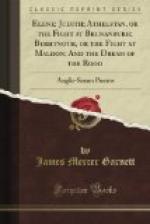PREFACE.
This translation of the Elene was made while reading the poem with a post-graduate student in the session of 1887-88, Zupitza’s second edition being used for the text, which does not differ materially from that in his third edition (1888). It was completed before I received a copy of Dr. Weymouth’s translation (1888), from Zupitza’s text; but in the revision for publication I have referred to it, although I cannot always agree with the learned scholar in his interpretation of certain passages. Grein’s text was, however, used to fill lacunae, and in the revision the recently published (1888) Grein-Wuelker text was compared in some passages. The line-for-line form has been employed, as in my translation of Beowulf; for it has been approved by high authority, and is unquestionably more serviceable to the student, even if I have not been able to attain ideal correctness of rhythm. I plead guilty in advance to any lapsus in that respect, but I strongly suspect that I have appreciated the difficulty more highly than my future critics. The Elene is more suitable than the Beowulf for first reading in Old English poetry on account of its style and its subject, which make the interpretation considerably easier, and I concur with Koerting, in his Grundriss der Geschichte der Englischen Litteratur (p. 47, 1887): “Die Elene eignet sich sowohl wegen ihres anmutigen Inhaltes, als auch, weil sie in der trefflichen Ausgabe von Zupitza leicht zugaenglich ist, als erste poetische Lectuere fuer Anfaenger im Angelsaechsischen.” This statement is now the stronger for English readers because Zupitza’s text is in course of publication, edited with introduction, notes, and glossary by Professor Charles W. Kent, of the University of Tennessee. I have appended a few notes which explain themselves, and have occasionally inserted words in brackets.
The translations of the Judith and the Byrhtnoth were made in regular course of reading with undergraduate classes, the former in 1886, and the latter in 1887, the texts in Sweet’s “Anglo-Saxon Reader” being used, and compared with those in Grein and in Koerner. The text of Judith is now accessible in Professor Cook’s edition (1888).
The translation of the Athelstan has been added from Koerner’s text, compared with Grein and Wuelker, and in certain passages with Thorpe and Earle. For fuller literary information than the Introduction provides, the reader is referred to ten Brink’s “Early English Literature,” Kennedy’s translation (1883), and to Morley’s “English Writers,” Vol. II. (1888).
James M. Garnett.
University of Virginia, Va.,
May, 1889.




